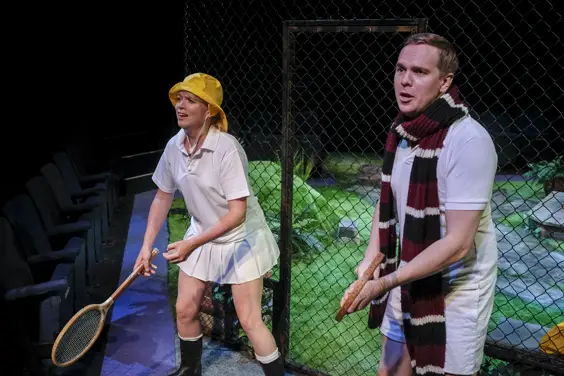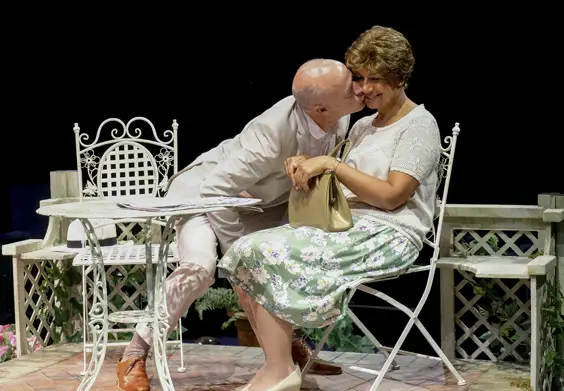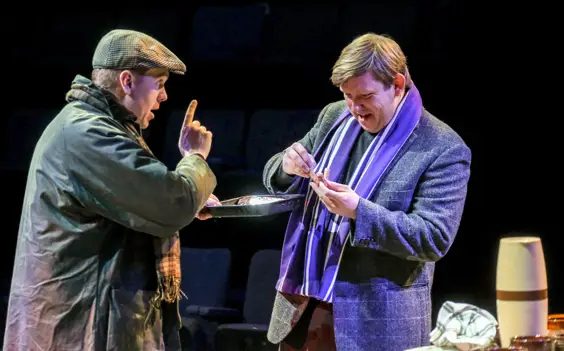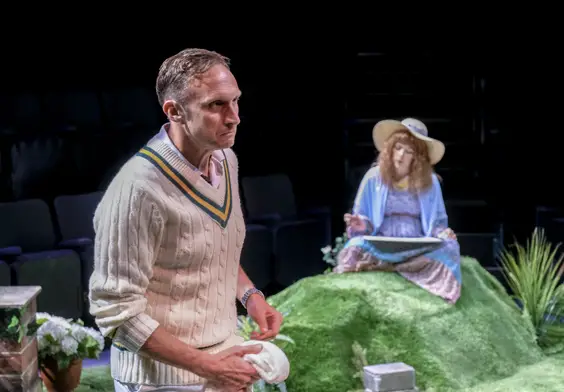Joking Apart – Review – Stephen Joseph Theatre, Scarborough
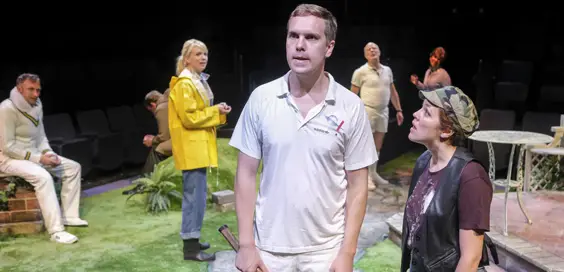
By Eve Luddington, August 2018
Usually, I’m wary of a play directed by the author. Not so with Alan Ayckbourn. He has longer than a 60-year association with Britain’s first theatre-in-the-round, in Scarborough, now in its third building. He has stage-managed, acted, written, composed and directed. He understands theatre, particularly theatre-in-the-round, inside-out. Ayckbourn, now 79, has written 82 plays so far. Most of his works shine a tragic-comic light on relationships between middle-class suburbanites, familiar to the Scarborough audiences where almost all are premiered. That’s a narrow focus, but Ayckbourn was known for decades as the world’s most-performed playwright after Shakespeare. Why? Perhaps because his plays illuminate the timeless, cross-cultural nitty-gritty of relationships between family and friends with irresistible, often dark, humour. And he’s a theatrical genius.
Joking Apart’s premiere was in 1978. This year, Scarborough’s Artistic and Executive directors asked him to stage his fifth production of the play, one of his favourites, to mark its 40th anniversary. Its original inspiration was Ayckbourn’s realisation that his son, 18 at the time, was able to vote and buy his dad a drink. ‘The passage of time suddenly caught up with me! I think with Joking Apart I began to feel my age’ (programme notes). Ayckbourn was 38 then. The dark thread running through his comedies has intensified as he has grown older.
“Emotional descent”
Joking Apart was written after an audience member asked why he never wrote about happy couples. His response was to dream up Anthea and Richard, the epitome of a couple, content in themselves, with one another and with their comfortable life. So far, so mundane – happy couples aren’t inherently dramatic. However, they are often the envy of their friends. Envy is a crucial element of this drama. So, too, is the blithe insensitivity of the happy couple as they sail through their successful life.
This production, like the original, is set between 1966 and 1978. Each of the four scenes is an occasion to which the same three couples are invited. The audience sit around Anthea and Richard’s garden, and a section of their tennis court, watching the lives of these six gradually grind down. As with many of Ayckbourn’s plays, we laugh while we squirm in our seats.
The first scene, Bonfire Night, introduces us to the neighbours, Hugh the new vicar (Jamie Baughan), and his nervous wife Louise (Louise Shuttleworth). She runs indoors to escape the fireworks. Hugh, enchanted by the lovely couple, particularly Anthea, welcomes Richard’s generosity in tearing down a fence to share the large garden. This act and Hugh’s blindness to the effect it will have on his wife sow the seeds of her emotional descent. While her self-esteem and confidence are eroding, his attraction to Anthea grows into a tortuous obsession.
“Beautifully crafted”
Brian (Richard Stacey) is always more keen to do jobs for the happy couple than to relate to any of his three diverse girlfriends, all played by Naomi Petersen. All seem to have been chosen haphazardly. Brian, like Hugh, has eyes for no-one but Anthea. His own emotions have been crippled for years by his secret love.
The circle of friends is completed by Sven (Leigh Symonds), Richard’s business partner, and Olive (Liz Jadav). They arrive an hour late for the bonfire party, though Sven is completely convinced that they are punctual. Olive’s assertion that he’s always right about time exemplifies the relationship between this couple. Her support of him is as extreme as his own high opinion of himself. And yet Sven, like the other friends, dwindles in stature as time goes on. Olive, his champion, becomes his fussing carer.
Each scene is beautifully crafted and enhanced by the design elements, including Ayckbourn’s own sound design. The garden set works equally well for summer and winter scenes. Costuming indicates character and period effectively.
“Tense and uncomfortable”
Ayckbourn’s plotting is, in all his plays, derived from the characters and their relationships, and is watertight. His observation and ear for dialogue are acute. In this production, he is well supported by the cast whose playing reminds us that we know these people: often they remind us of ourselves. In particular, Frances Marshall and Laurence Pears are genuinely attractive as Anthea and Richard, people we’d like to know – in theory. The character of Sven is, for me, the most fascinating. I was completely convinced by Leigh Symonds’ playing of a smooth, self-righteous, unknowingly funny man who is often irritatingly ‘right’.
The second scene, a Sunday morning in July, is the highlight of this production for me. Finely tuned to evoke a huge range of emotions from hilarity to sadness, and perfectly paced, this is Ayckbourn’s writing, stage vision and direction at its classic best. A tennis match, inventively staged, is happily lost by Richard. He likes to make others feel good. Sven calmly disparages everyone while talking himself up. Louise is tense and uncomfortable. Brian’s latest girlfriend sits apart on a mound of grass, impassively sketching.
“Calm declaration”
When the golden couple go to prepare lunch, an awkward silence falls among the others. Their spattered attempts at small-talk are exquisitely excruciating. It is Sven who gets the conversation going with his calm declaration that Anthea and Richard are ‘Nice people but they are invidious people’. They want, he says, to take people over. That remark shines a new light on Anthea and Richard for their friends who begin to talk animatedly, and tend to agree with Sven. At the end of the scene Brian’s girlfriend, the silent hippyish outsider, is left alone on stage. Slowly she stands, tears up her drawing and scatters the pieces. It is the symbolic act which ends the first half of the play. These characters will be metaphorically torn to bits by the happy couple’s invasive kindness and their responses of jealousy and envy.
Much less successful for me is the final scene. In one way or another, Anthea, Richard, and their daughter, are the only ones left standing. Notably, Louise has had a breakdown. The causes are clear and our sympathies are with the character. Given that, I was surprised that her unpredictable behaviour and reactions to it, were so underplayed. Often, by the end of an Ayckbourn play, I am so involved with the characters, I want to shake them and scream: ‘If only you’d…’ That would match Sven’s assertion that ‘The tragedy of life is not that man loses, but that he almost wins’. At the end of this production, I wasn’t moved. It felt like a muted ending.
images: Tony Bartholomew
